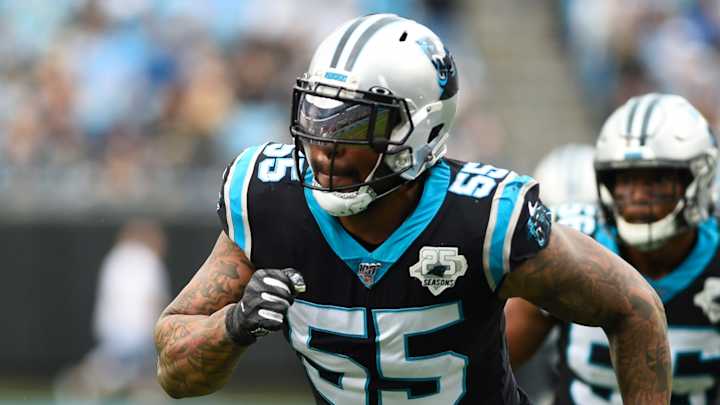News Flash: Seahawks Have Minimal Cap Flexibility

On the heels of the 2020 NFL Draft, the Seahawks moved swiftly to create additional cap flexibility, releasing veteran center Justin Britt and guard D.J. Fluker.
With the two moves, the organization created more than $12 million in cap space. This left many fans and media members alike speculating the cuts were made to free up space to make another run at re-signing defensive end Jadeveon Clowney, who still hasn't signed a contract nearly two months after the start of free agency.
But nearly two weeks later, the Seahawks haven't made any new overtures to Clowney, who remains in Houston waiting for the right deal. Based on recent comments by general manager John Schneider, the franchise plans to be cautious with remaining cap space moving forward to allow spending during the season if needed.
“We are just one of those teams that wants to be active throughout the season as well, so we try to budget accordingly,” Schneider said in an interview with Jason LaCanfora on 105.7 the Fan in Baltimore.
Schneider has publicly stated on numerous occasions the door remains open for Clowney to return, but the Seahawks don't have near as much cap space as most believe they do, which limits the team's ability to even match prior offers made to the star defender. Other options such as Everson Griffen also may be out of their price range.
Even after releasing Britt and Fluker, the Seahawks don't have much cap space available. Heading into Friday, OverTheCap.com listed Seattle with $21 million, but that doesn't include rookie wages, payments for players on the practice squad and injured reserve, and potential injury settlement payments for Britt, Ed Dickson, Tedric Thompson, and Naz Jones, who were all released with failed physical designations.
Further eating into Seattle's cap space, ESPN's Brady Henderson reported Bruce Irvin will earn up to $5.9 million for the 2020 season. Factoring his contract into the equation with the aforementioned costs, per John Gilbert of Field Gulls, the Seahawks have a little over $4 million in true cap room to play with. That's it.
Now that we know Irvin's cap hit is $5.9M, the Seahawks have just over $15M in space.
— John P Gilbert (@JohnPGilbertNFL) May 8, 2020
$3.9M for potential Art. 45 Injury Settlement payments (Britt, Jones, Dickson & Thompson).
$2.1M for draft picks.
$5M for PS & IR.
So about $4M in effective cap space. https://t.co/nxZz1Myqq8
Some fans will argue Schneider overpaid for Irvin, but under the terms of the deal, he would be the 29th highest paid 4-3 defensive end in the NFL. Last year, he produced 8.5 sacks, which would have been twice as many as team leader Rasheem Green had for Seattle, and recorded a pressure on 11.1 percent of his pass rushes.
While the Seahawks can be (and probably should be) criticized for not giving a better offer early in the free agency process, the contract for Irvin seems like a fair deal given his overall body of work as a pass rusher. And as Schneider has pointed out, with Clowney taking his time on a decision, the team had to take care of other business.
Other moves made this offseason by Seattle, such as signing tackle Brandon Shell or guard Mike Iupati or defensive end Benson Mayowa, didn't break the bank either. The team, for better or worse, made a series of frugal signings rather than splurging on one or two players.
Some fans will look back upon this offseason wondering if the Seahawks played their cards correctly, especially when it comes to addressing the pass rush in free agency. But Schneider and the front office feel pretty good about the moves they've made and there's still enough cap room to make a few more signings in coming weeks.
With that said, even if you're a riverboat gambler, don't expect it to be Clowney. While there are ways additional space could be created, it's unlikely Seattle will be able to or willing to field a viable offer from here on out.

Graduating from Manchester College in 2012, Smith began his professional career as a high school Economics teacher in Indianapolis and launched his own NFL website covering the Seahawks as a hobby. After teaching and coaching high school football for five years, he transitioned to a full-time sports reporter in 2017, writing for USA Today's Seahawks Wire while continuing to produce the Legion of 12 podcast. He joined the Arena Group in August 2018 and also currently hosts the daily Locked On Seahawks podcast with Rob Rang and Nick Lee. Away from his coverage of the Seahawks and the NFL, Smith dabbles in standup comedy, is a heavy metal enthusiast and previously performed as lead vocalist for a metal band, and enjoys distance running and weight lifting. A habitual commuter, he resides with his wife Natalia in Colorado and spends extensive time reporting from his second residence in the Pacific Northwest.